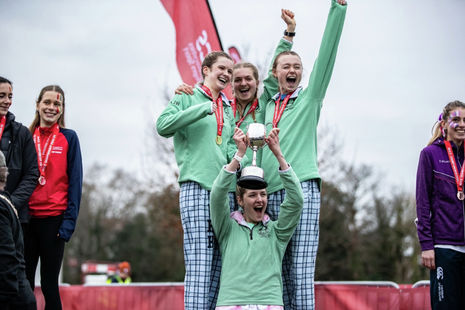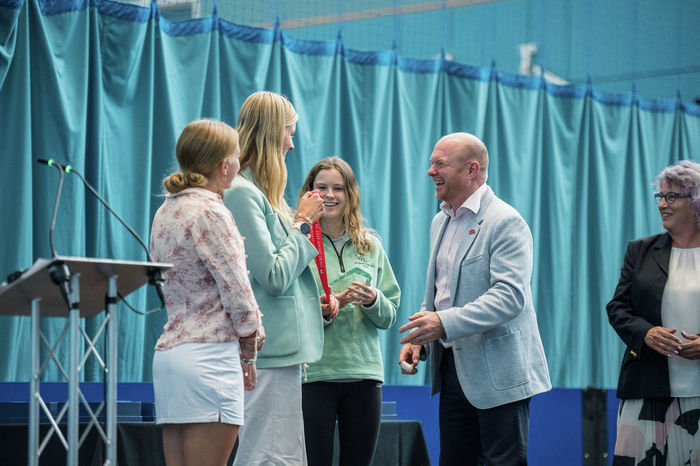How sport can shape lives: a conversation with Bea Wood
Varsity record-holder Bea Wood sits down with Louise Crary to discuss how her running career brought her to Cambridge and where it will take her next

Amongst last week’s Cambridge graduates was an English Literature student who has spent almost as much time on the track and running on trails in Cambridge as she has with John Keats and Wordsworth. An internationally ranked runner and Asics athlete, Bea Woods set the fastest Varsity 5000m time ever earlier this year by finishing a whopping 12 seconds faster than the previous record.
When I began talking to Bea, I thought we would discuss things like her training schedule, her favorite race, and what brought her to the Hares and Hounds – and while we did cover all of these, I found that the conversation drifted more towards the impact running has had on her life here at Cambridge and the community that she’s gained through the sport.
Bea began playing sports at a very young age. She grew up in a tiny village, with a family full of athletes and a very active lifestyle, and has always been naturally inclined towards endurance events, driven by a competitive spark. She’s been doing competitions for well over a decade now, but wasn’t the champion that she is now at the very start. Bea began winning tournaments after she moved to Salisbury at the age of 11 and began training at a new facility there. It wasn’t always just running for Bea, though. In primary school she was split between deciding whether to pursue running or hockey. Luckily for the Cambridge Hares and Hounds, Bea chose running.
“An internationally ranked runner, an Asics athlete, and someone who set the fastest Varsity 5000m time ever”
As someone who had a lot of success at the junior level, winning regional and national competitions, I asked Bea why Cambridge was her university of choice. Why not go to the US, or to a more athletics focused programme in the UK? As most Cambridge students would answer, Bea said that when looking at universities, her priority was academics, not running, and so Cambridge was her top pick. Yet Bea’s time running at Cambridge has truly shaped her university years.
When I asked Bea to describe the effect that sport has had on her time at university she said that running had been an “enriching experience” for her. She described sport and her relationship with it as a sort of dual life that she led. If things weren’t going well in other parts of life, running would act as this sort of “other life,” so that when Bea’s head hit the pillow at night she always had a sense of having accomplished something. Running gave Bea what she called an “extra layer” of friends and experience during her time at Cambridge.
Bea’s way of thinking about running and sport is very different to the manner that people at Cambridge often talk about extracurriculars. She never discussed it as a chore or even something that she had trouble making time for. For her, sport was a vital part of her life at university, and it was something that helped her succeed at school. Going forward, running is still playing a big role in Bea’s life. She talked about how running was making her transition between university life and the graduate world easier, saying: “If I didn’t have running, I think that sadness I’d feel leaving Cambridge would be so overwhelming, but because I have running I have something else.”
“If I didn’t have running, I think that sadness I’d feel leaving Cambridge would be so overwhelming”
Nevertheless, the balancing act that Bea played for three years between her degree and her sport did come with some challenges, and she put extra emphasis on the issue of recovery. For athletes, time to recover after training or racing is almost as important as doing the sport itself. What Bea says she didn’t realise at first was that working at a desk and reading were not the same as recovery.
She recounted a year when she got back from BUCS and the following day – instead of eating and sleeping when she got home in the evening – she sat and wrote an essay with one of her teammates, laughing at the fact that other competitors were probably having dinner and going to sleep. When asked about her ideal recovery after a session, Bea said that she’d love to spend her time lying in a field and reading after running, but often finds that needing balancing study with sport gets in the way.
She described BUCS Cross Country as a “festival of running,” and such an “incredible, berserk event” which was “horrible and messy and squalid,” but nevertheless enchanting to look back on. She joked about “chugging pasta” pre-race, something many endurance athletes can probably visualise having done at some point in their lives.
As she moves forward in her running career, Bea is looking to stay associated with the University’s coaching team and keep a similar schedule to her training here, which truly highlights her love for the Cambridge programme. While talking to Bea I found that the way she approached her life at Cambridge was just as impressive as what she actually accomplished. I’ve hardly ever talked to someone so passionate about their sport. As she put it: “I run for the love of running”. Bea’s success goes to show that loving what you do really can make anything possible. Even getting a Cambridge degree while training to be one of the best runners in the UK.
 News / Judge Business School advisor resigns over Epstein and Andrew links18 February 2026
News / Judge Business School advisor resigns over Epstein and Andrew links18 February 2026 News / Hundreds of Cambridge academics demand vote on fate of vet course20 February 2026
News / Hundreds of Cambridge academics demand vote on fate of vet course20 February 2026 News / Petition demands University reverse decision on vegan menu20 February 2026
News / Petition demands University reverse decision on vegan menu20 February 2026 News / CUCA members attend Reform rally in London20 February 2026
News / CUCA members attend Reform rally in London20 February 2026 News / Gov grants £36m to Cambridge supercomputer17 February 2026
News / Gov grants £36m to Cambridge supercomputer17 February 2026










